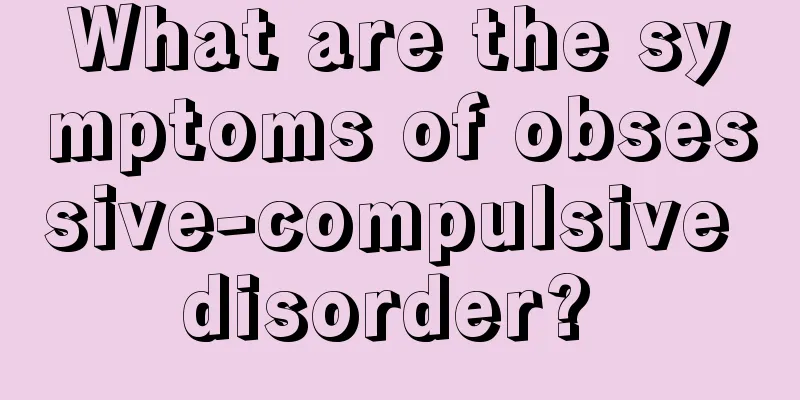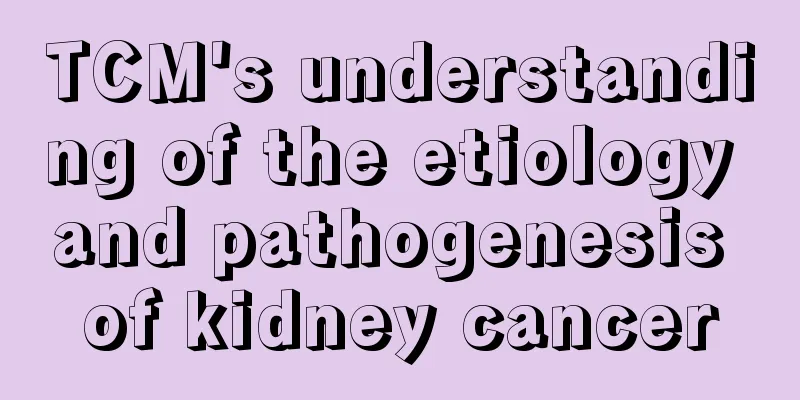What are the symptoms of obsessive-compulsive disorder?

|
Many people often hear the term obsessive-compulsive disorder in life, but what exactly is obsessive-compulsive disorder? This makes people feel confused. Obsessive-compulsive disorder has various manifestations in life and will have a certain impact on life and physical health. So when everyone thinks that this kind of thing is not a serious illness, they are very wrong. So what are the symptoms of obsessive-compulsive disorder? 1. Obsessive thoughts refer to the patient's loss of control over a certain subconscious desire, impulse, or an idea that he knows should not and is unnecessary to appear. Although he tries to get rid of it, he is unable to stop and eliminate this involuntary repetitive thinking. Common obsessions include: 2. Compulsive recollection and association: This means unconsciously repeating and remembering certain things that you have experienced or done, as well as what you or others have said. Common symptoms include a past event, a sentence or a song repeatedly appearing in the mind. Bin's symptom is compulsive recollection. 3. Compulsive doubt: doubting what you have just done, such as doubting that the door is not locked after you have just locked it; doubting that you did not put a stamp on the letter after you put it into the mailbox; doubting that you missed or made mistakes in the homework after you have just finished it; and doubting that your hands are dirty after you have just washed them. Obsessive-compulsive patients often show doubt and anxiety, and perform compulsive behaviors, such as repeated checking and repeated washing of hands. 4. Compulsive opposing ideas: Simply put, the more you want to control the thoughts, the more they will keep appearing. Such thoughts or ideas are often bad and violate moral concepts. They are a reflection of the patient's potential desires. Therefore, the patient feels deeply ashamed and nervous, afraid of being seen by others, and tries hard to control them. However, the more he tries to control them, the greater the temptation becomes, and the more frequently they occur, which constantly increases the patient's sense of guilt and inferiority. 5. Compulsive thinking: This symptom is similar to being obsessed with trivial matters. The patient will dwell on some meaningless issues and become entangled in them and unable to extricate himself. A female student said during a psychological consultation: "Because I am not good at studying, I am under a lot of pressure, so I always force myself to figure out all the knowledge points, and I will try my best to think even if I can't figure it out. But recently, I sometimes think of some strange questions, such as why 1+1=2 is not equal to 3? The more I think about it, the more confused I am, so I enter a vicious circle. I was very nervous and began to resist this idea firmly, but I got deeper and deeper into it, and I couldn't even study normally." This is a typical symptom of obsessive thinking. The patient's thinking is like being forced onto a never-ending train with no end, and eventually he is exhausted both physically and mentally. |
<<: Does irregular heartbeat require treatment?
>>: Why does my stool always come in small pieces?
Recommend
What's the matter with being unable to hold back poop?
Defecation is a very common thing in life, and ba...
What to do if gastric cancer metastasizes to the brain? What are the symptoms of brain metastasis
The stomach is an important digestive organ of th...
The right mental and spiritual state is a powerful weapon against colorectal cancer
Colorectal cancer is a common type of intestinal ...
Progressive dysphagia is the most common symptom of advanced cardiac cancer
Cardiac cancer is a very common malignant tumor. ...
If the tongue appears, be careful of respiratory arrest
The tongue is one of the most familiar organs to ...
What should I do if I have back pain and stomach pain during menstruation?
The menstrual period is a very critical period fo...
Specific diet therapy plan for colon cancer surgery
In daily life, patients with colon cancer who hav...
The dangers of lying down after eating
I believe that many people will feel very tired a...
Why do I feel dizzy and sweaty when I wake up in the morning?
Everyone needs to pay attention to the reasons wh...
Will cervical cancer cause lower back pain and bleeding?
Will cervical cancer cause lower back pain and bl...
There is a lump on my neck that hurts when I press it. So this is what's going on
The appearance of a lump on the neck itself will ...
The bottom of the nails is purple_The color of the nails is a little purple
Nails may seem to have no function, but in fact t...
Teratoma Medication Guide
Teratoma is a common disease in women. It is a be...
Tips to whiten teeth quickly
Yellow and black teeth are quite common in daily ...
Can foreign matter in the eye be expelled by itself?
Eyes are a very important part of our body. We mu...









